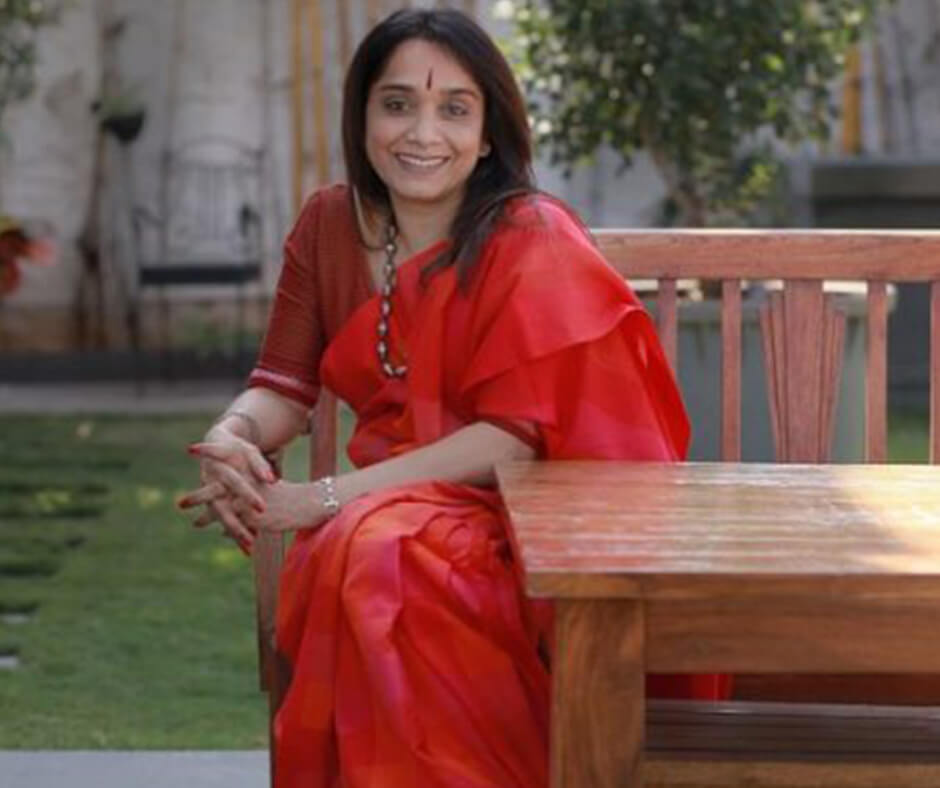The enigmatic Sudha Menon shares her incredible parenting lessons

Sudha Menon needs no introduction. She is a successful Author, a columnist and a writing coach. She has written four non-fiction books, Leading Ladies: Women Who Inspire India, Legacy: Letters to their daughters from eminent Indian men and women, Gifted: inspirational stories of people with disabilities and Devi, Diva or She-Devil: The smart Career woman’s survival guide.
Before she became a full-time author, she had a demanding career in Journalism while she simultaneously brought up her daughter Nayantara.
In this interview, Sudha shares her parenting journey, her trials and tribulations, her incredible parenting lessons and takeaways that all parents can learn from. And she does this with a rare honesty. I hope you ll enjoy reading this interview as much as I enjoyed taking it.
Q. You married young and had a baby also when you were pretty young. These days, men and women choose to marry late, have kids even later as they wish to prioritize their careers. Some of them also choose not to have kids as they consider the entire exercise of having kids, raising them, settling them down – quite futile. What is your take on this? Is it really futile, especially when many parents find it difficult to deal with the empty nest?
Sudha: Parenting is not a small responsibility to undertake, especially if you are doing it because society or your parents expect you to have kids and raise them. It is a lifelong commitment that expects you to put hundred percent of you into the role.
I think it is only fair to let every couple make their own choice without being judged for it. Having children is the greatest joy to some but to others who are not ready, it might seem intimidating and scary. Who are we to judge anybody on their life choices? I know many numbers of couples who have bypassed childbearing and lead perfectly joyous, meaningful lives. Some keep a pet, others use their time and money to travel and explore the world…To each, his own is my motto in life.
Q. In your book Legacy, where famous parents have written letters to their daughters, most parents have emphasized that their children should pursue a career where their passion lies, and also give importance to creating an impact in the world around them. Your daughter has chosen an off beaten career path. How much of that decision was influenced by you and your hubby or by your collective parenting style?
Sudha: Even though I am a good cook when I put my mind to it, spending time in the kitchen has never been my thing and so, nobody was more surprised than me when my 8-year-old daughter started pottering in the kitchen and making cookies and stuff. When she told us at 20- when she was already doing her graduate degree in communication- that she wanted to become a pastry chef, my husband and I were delighted. There is nothing more joyful than getting to live your dream and Nayantara is now a successful pastry chef who has co-founded Parisserie India, a boutique patisserie which has made its mark in Mumbai for divine French entremets and dessert.
There were plenty of naysayers, believe me. My mother even today believes it was wrong of me to encourage my daughter to take up a career which involves so much hard work and not enough remuneration. “Send her for an MBA course and her life will be made,” is my mom’s constant refrain and I respond by reminding her that when I told her at age 18 that I wanted to be a journalist, she had been the first to encourage me. I knew that my family could have done with the extra financial support if I became a clerk in a bank or an insurance company but my parents never once let me feel guilty or discouraged me from pursuing my dream. I wish more parents understood the importance of allowing their children to pursue their dreams.

Q. How did you manage travel, and long hours of work with a growing up child? And how did you deal with the guilt that comes with being a working mom?
Sudha: I was blessed with parents and sisters who generously opened their hearts and their home to my toddler and raised her like their own child. Nayan grew up in my parent’s house and even today my mom (dad passed away a couple of years ago) and my younger sister are more her parents than I am. My sister studied for her Masters in English literature while simultaneously rocking my baby to sleep on her lap. I was the mom who came home just an hour before the baby went to bed and left for work when she was barely awake.
Guilt was my companion through all my years of raising her. When we moved to another city with Nayan, it was traumatic for all of us- she missed my parents and I struggled with becoming nurturer number 1 along with my new job where I was leading an independent bureau for a newspaper. She had no friends in the apartment block we had moved into and I tried every trick in the book including bribing the neighborhood kids with treats of sweets, shiny toys, and joyrides in my car so that they would be friends with my little girl. There were days when I almost groveled at the feet of other moms in the community so that they would include my child in their birthday parties or play dates.
I can safely say that I have done everything I could and more just so that she never felt friendless and alone. Only my unwavering commitment to my chosen career kept me from throwing it all away and being at home to take care of my girl. But look at the miracle of life, we are all fine and we have raised her into a fine young woman who is kind, compassionate, hardworking and loving.
Q. Is parenting a matter of learning or is it like a training ground that you have to adapt to and automatically learn from? Do you think parenting buddies like WOW Parenting can add some sanity to this overwhelming experience?
Sudha: I learned everything about parenting on the ground. I have floundered, fallen, gotten up, licked my bruises and gotten right back to being a committed parent. Nothing in the world prepares you for the huge responsibility that comes along with the role of parent and chief caretaker.
My bible in my child-rearing years was Dr. Benjamin Spock’s Baby and Child Care. Every baby sneeze, running nose or wail had me reaching frantically for Dr. Spock’s book but I must confess that my biggest learning and help came from amma’s homegrown wisdom from having raised four of her children. She taught me about ways to get my finicky toddler to eat, taught me the virtue of patience and the magic in a tight hug when the offspring is hurting. My daughter is 26 now and I think I am still learning to be a parent. The challenges are different now but I know that the magic of a tight hug still works when my child is hurting.
Given how different the world is today and how different and formidable the challenges of parenting generation Z, I think parenting buddies of all kinds will have something to offer the desperate parent. But my final take on this would be that there is no such thing as a perfect parent. Or a perfect kid. We would, each of us, do well to listen to well-meaning advice but learn to trust our own instinct about parenting issues.
Q. I read your very interesting take on Parenting where you said: “Earlier parents had the courage to be parents instead of the weak-willed new generation of parents who are far too distracted to be doing any parenting.” Share your thoughts on how can parents – both father and mother do healthy, meaningful parenting.
Sudha: I learnt everything I have about parenting by simply observing my own parents. I learnt about unconditional love, about leading by example, about kindness and compassion for every living being from seeing them practice these virtues. They never lectured us about anything and never put pressure on us for anything including academic performance. They let us be the people we were, gave us a good education and let us free to follow our own dreams. And we never doubted for a moment that they would be always available for us if we needed bailing out or just some reassurance. I try and do that with my own daughter though I must confess that often times end up advising her on stuff she would rather figure out herself. I have to constantly fight the temptation to step in and resolve things for her because it pains me to see her struggle. I remind myself of my own younger days and how my parents allowed me to learn from my mistakes.
My father once told me that if you want your children to grow up into responsible human beings you have to stop stepping in to solve their problems. Some hardship and struggle are good for all of us; it will bring out our best selves.
Q. When we were growing up, families watched tv together. Programs like Ramayan, comedies like dekh bhai dekh helped in bonding. Now there is hardly any tv show that the family can enjoy together. So we are fast becoming a selfie-obsessed nation, where time together is going out all decked up, pouting for selfies and updating our social media timelines. Unknowingly that’s what we are really passing on to the next generation. What can be done for spending quality time together where we pass on some values to our kids?
Sudha: I recently invited my daughter and husband for a day trip where we learnt the art of baking bread from a veteran chef and it is possibly the best time I have had with my child and spouse in a very long time. Travelling and trying our hands at new experiences have a way of pulling families together and I experienced it at the bread workshop. We enjoyed the measuring out of the ingredients, the kneading, pounding and popping the bread into the oven, the waiting with bated breath for the freshly baked loaves to come out and enjoyed tearing off great chunks of it to relish. We were like little children in a candy shop and we laughed all day from excitement.
Even though we all live in big cities it is possible to take a day trip off or spend the day browsing in old bookshops or reading in a library, visiting a museum, sitting in a park or simply signing up to learn a new skill. I am all for spending a day just lazing at home with no pressure to cook- we simply order food in or rustle up a simple dal-khichdi, watch out favourite tv shows together or chat. It is all about just applying our minds to it and coming to a decision about an activity you and your children will enjoy.
Q. With so much of competitive pressure on kids, it is important that parents focus more on the IQ rather than the EQ. Can you tell us how parents can develop EQ in their kids?
Sudha: Through leading by example. Show your kids that money and material things are not the measures of success; having happy, meaningful relationships, fulfilling friendships and a joyous, peaceful life is what it should be about. Give them the company of older people, grandparents from whom they can learn about the olden times, teach them about kindness, respect for everyone, teach them about inclusion and respect for all genders. None of this can be taught from textbooks but only by practicing these in real life.
Q. In your book Legacy Amit Chandra, MD of Bain Capital Advisors has this advice for his daughter –
“Whatever it is that you choose to do, remember that you don’t have to be rich or famous or successful, you just need to enjoy the journey and be happy.”
This thought is revolutionary and not many parents in India convey this to their kids. Kids are pushed into half a dozen extra classes and motivated to excel in all. Some parents claim they do this so as to find out where the passions of the child lay. What is your take on this?
Sudha: Each of us comes into this world with a certain set of abilities and gifts and I am convinced that we will take that path which is meant for us. I am all for teaching children about the power of excellence and following our dreams single-mindedly. But I am completely against parents telling children what dreams to dream and what is the dream that will get them money, fame and big cars. Let our kids grow up free, without prejudice and bias and the rest will sort out on its own.
Q. In your book Legacy, Ajay Piramal of the Piramal group quotes from the Upanishads –
You are what your deep driving desire is,
As your desire is, so is your will,
As your will so is your deed,
As your deed so is your destiny”
Would you be able to suggest any activities, through which parents can plant such thoughts in the impressionable minds without sounding preachy, without giving boring lectures?
Sudha: Give them good books to read, expose them to the autobiographies of people we all admire, expose them to the diversity of thought and social status, teach them to respect people, believe in the dignity of labour and the equality of every man and woman. And above all, remember to teach them all of this by practising it yourself.
Q. What role can a husband play in making the life of the working mother easier?
Sudha: The husband who can be an equal partner with every responsibility at home will be the best enabler for a woman who has dreams of her own other than her role as mother, wife and homemaker. The husband who constantly supports his wife’s dreams and aspirations and holds her hand as she sets out on often solitary and sometimes scary journeys is the best companion for every woman, be it a homemaker or a career woman.
Q. How do working couples, manage quality time together and fine tune time with kid(s)?
Sudha: With clever planning, discussion, negotiation and commitment families can figure out a particular time of the day/week to do things they can enjoy together. It is not easy but it is not impossible either but each stakeholder has to be invested in this situation.
Q. Is it practical for a working mother to be ambitious as well as be a wow mother?
Sudha: Anything is possible if we set out minds to it but my advice to women always has been to stop trying to be perfect and to stop trying to do too many things yourself. Hire people to relieve you of the burden, outsource, delegate and simply have faith in others that they will do the job well. If you try to juggle too many balls in the air at the same time you are likely to drop the balls. Instead, try to do just a couple of things but do it well.
Q. How to balance work, social activities, me time and parenting?
Sudha: By planning in advance, sticking to schedules and by avoiding the temptation to do everything yourself. The quest for perfection is the biggest anxiety creator in most women.
Q.Who inspired you in parenting?
Sudha: My mother. She had almost nothing to raise us with. Money was scarce but she is a resilient woman and she gave us a great education, taught us to be unwaveringly honest and showed us by example that we human beings can overcome every hurdle with hard work and commitment. She is 71 today and continues to inspire me with her capacity for endless commitment to her brood.
Q. Any mistakes that you made that you believe, others should avoid?
Sudha: Trying to make my little one do things the way I did it. Big mistake. I know now that it erodes their confidence when we try to correct them or compare them to others. Leave your kids free; don’t try to make them a mere reflection of you. The world needs different kind of people. Not everybody has to be super successful, go-getting, driven individuals. I have learnt to appreciate the gentle, mild young lady that my daughter is and respect her calm, collected ways; In fact I have learnt for her that there is a great joy to be found in a life that does not involve constant hustle-bustle and running around.
Q. How did you handle the difference of opinions between you and your children?
Sudha: In the beginning, I would lose my temper and raise my voice. Now I simply let her do things her way. I have made sure she knows that there will be consequences- good, bad or ugly that she will have to face.
Q. Did you ever have an argument with anyone about which is a better way to bring up your child?
Sudha: With my mother. Constantly. She is old world in her outlook and still believes in mollycoddling my daughter. She tells me I should make my daughter do her Masters in Business Administration. I have no such intention because my daughter is a passionate baker who is living her dream right now, having co-founded a baking studio of her own, Parisserie India.





